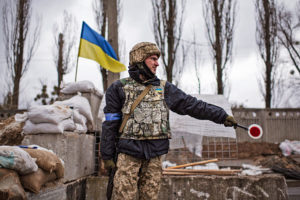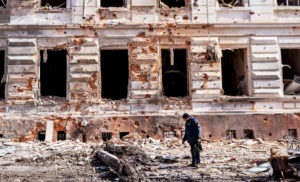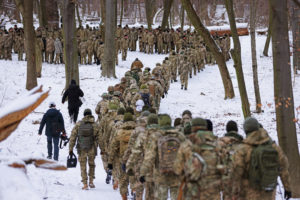The arrival of Big Macs, skinny fries and those absurdly-thick shakes in Moscow 32 years ago heralded a moment of hope that the world was entering an era of peace and prosperity after the Cold War. This was at a time of Western triumphalism, when optimists proclaimed that rampant capitalism was benevolent and history was ending amid the unstoppable ascent of liberal democracy.
Now, though, McDonalds is pulling out of Russia — a move laden with heavy symbolism. The hamburger giant was among more than 1,000 Western companies to close down operations following Putin’s Ukrainian invasion. Most swiftly saw the potential collateral damage to their brand if they stayed in the Russian market. Yet the fast food firm has moved beyond its initial suspension of sales to announce that it is selling its 850-strong chain in the country to a local buyer.
“It is impossible to imagine the Golden Arches representing the same hope and promise that led us to enter the Russian market 32 years ago,” Chief executive Chris Kempczinski told staff and suppliers as he announced that the company was to permanently withdraw from the country.
Hundreds of Russians were waiting outside when the first branch — a 900 seater in Pushkin Square — opened its doors in January 1990, a moment that presaged the end of the Soviet Union with its infamous consumer shortages. Some excited citizens dressed in Disney costumes to mark their admiration for America and a record 34,000 burgers sold on the first day alone. Later the firm imported special potatoes to Russia and flew in foreign experts to help develop special baking and cattle-rearing systems. Now there are 62,000 staff and branches in 11 different time zones.
Michael Gorbachev, then general secretary of the Communist Party, won the Nobel Peace Prize in the year McDonald’s arrived and later went on to star in a Pizza Hut commercial. But he was banned from Ukraine after backing Russia’s 2014 invasion of Crimea and later spoke about his admiration for Putin. “The manual control of authoritarianism was needed to overcome the situation that our friends, our former friends and allies, created for Russia by pushing us out of geopolitics,” he told Time, echoing the President’s own distorted narrative that has led to this shocking war in Europe.
I ended up eating chips smothered in alleged cheese and mayo in a Ukraine McDonalds a couple of weeks before the conflict kicked off — the only place open late in Kharkiv. Now the streets of the country’s former capital are in ruins, the city devastated by Putin’s bombs, while the burger chain has temporarily departed Ukraine. It is paying staff and giving assistance to refugees — but it would be far more helpful if such Western brands re-opened their branches to show support for the country in places away from the frontline. Walking around Kyiv yesterday, it was noticeable how many foreign-owned stores remain closed.
Before Kharkiv, my previous McDonalds was in Belarus, where I was reporting on pro-democracy protests two years ago. I was chased in to a Minsk branch by paramilitary thugs, who grabbed a few demonstrators for their torture chambers as we scanned the menu hastily trying to look like customers. Such is the firm’s ubiquity. The significance of its place in global capitalism led The Economist to invent an index using the cost of a Big Mac to assess purchasing power in nations. There was also another theory that no two countries containing franchises of the firm would go to war, intended to show how rising wealth led to falling violence, but this hubristic idea was quickly crushed by conflict in the Balkans.
Removal of the Golden Arches from Moscow spotlights the arrival of another Cold War between democracy and dictatorship. For the moment, it is focused on Russia after Putin’s atrocities in Ukraine. But his allies in China are looking hungrily at Taiwan as they watch this war play out — another reason why this fight is so important. The retrenchment by McDonalds comes after the pandemic focused corporate minds on the pitfalls of long supply chains while exposing how Beijing’s rulers could not be trusted after a global battle broke out against a mysterious new disease that emerged within its borders. Even now, they resist global efforts to discover the truth about Covid’s origins.
Russia was already cutting itself off from the West — like China — with a war on foreign media and technology firms to protect the ruling circle of thieves even before the imposition of wartime sanctions and exodus of foreign firms. Now McDonalds is the perfect illustration of how how Ukraine’s existential struggle for survival is accelerating the divide between autocracies and liberal democracies. The economic fallout from this war with rising energy and food prices is being felt around the world — and I suspect there are more explosions still to come as the shock waves ripple around the planet.
Since the success of McDonald’s is largely down to marketing rather than culinary finesse, the gap it leaves in the Russian market will be rapidly filled. Already firms are filing applications to trademark names and logos that look suspiciously familiar. When the burger behemoth pulled out of Donetsk after the Russian-backed separatist takeover in 2014, its branch in the city was replaced by ‘Donmac’, complete with a Golden Arches logo and little red boxes for fries.
But while Russians continue to enjoy their burgers and fries, the rest of the world — which has become wealthier through co-operation, consumerism, democracy and globalisation — is becoming more fissured, more fractious and far more suspicious. Ultimately, we may all end up as losers from these turbulent events.
Disclaimer
Some of the posts we share are controversial and we do not necessarily agree with them in the whole extend. Sometimes we agree with the content or part of it but we do not agree with the narration or language. Nevertheless we find them somehow interesting, valuable and/or informative or we share them, because we strongly believe in freedom of speech, free press and journalism. We strongly encourage you to have a critical approach to all the content, do your own research and analysis to build your own opinion.
We would be glad to have your feedback.
Source: UnHerd Read the original article here: https://unherd.com




